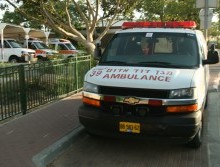
Joint Israel and Palestinian medical research could teach more about cancer. Israeli MDA ambulance. Illustrative. By Joshua Spurlock
Israelis and Palestinians may be in the midst of a conflict dating back many decades, but they’re also working together to fight a different battle altogether—the fight against cancer. Joint research by Israelis and Palestinian professionals looked at Non-Hodgkin Lymphoma (NHL) tumors in both Arab and Jewish populations and concluded that while some factors associated with NHL seem to be shared for the two groups that live in the same general geographic area, others were quite different. This raises a host of questions that could ultimately help better understand the impact of genetics and environment on cancer g.
It also offers opportunities for more joint work in the future, noted Professor Ora Paltiel, director of the Hebrew University-Hadassah Braun School of Public Health and Community Medicine. Prof. Paltiel, who led the research, said in a press release from The Hebrew University of Jerusalem on the effort that disease research has “the potential to improve and preserve human health, and it can also serve as a bridge to dialogue among nations.”
The press release noted that the research, published in the journal PLOS ONE, found that some of the shared factors associated with NHL were blood cancer family history, recreational sun exposure, and black hair-dye use. Yet the two ethnic groups also showed a number of varying factors, including autoimmune diseases amongst Israeli Jews and blood transfusions for Palestinian Arabs.
Said the Hebrew University press release, “The fact that risk factors operate differently in different ethnic groups raises the possibility of gene-environment interactions, that is, that environmental exposures act differently in individuals of different genetic backgrounds.”
The sizable research project looked at 1600 different persons, roughly half of whom had B-cell non-Hodgkin lymphoma (B-NHL), using multiple methods ranging from questionnaires to genotyping.
NHL is a serious problem for both Israeli Jews and Palestinian Arabs. As of 2012, Israelis had the highest rates of NHL incidents in the world, making it their fifth-most common malignancy. It’s the eighth most common malignancy for Palestinians living in Judea and Samaria (also known as the West Bank).
Institutions involved in the research included Israeli and Arab universities and hospitals. Said Prof. Paltiel in the press release, “The study provided opportunities for training Palestinian and Israeli researchers, and will provide for intellectual interaction for years to come.”
(By Joshua Spurlock, www.themideastupdate.com, February 19, 2017)
